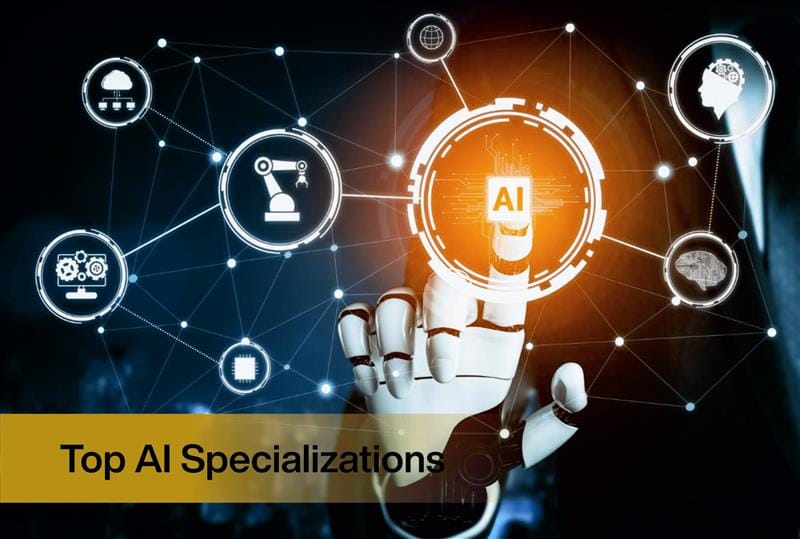Artificial Intelligence (AI) has become the defining force in modern technology, transforming industries and creating new career pathways for engineers. Pursuing an AI specialisation empowers students with advanced technical and analytical capabilities, ensuring their relevance in the evolving digital landscape. Today, AI in engineering represents innovation, efficiency, and future-readiness for global industries.
Understanding AI Specializations in Engineering
An AI engineering program focuses on designing intelligent systems capable of performing human-like tasks such as learning, reasoning, and decision-making. These programs teach students how to apply AI technologies in engineering domains like robotics, automation, and data analytics, equipping them with essential AI skills for engineers to tackle real-world challenges.
Core Focus Areas of AI Programs
Students enrolled in engineering programs with an AI focus in India study a blend of subjects, including machine learning, neural networks, natural language processing, and data science. These core areas help them understand both theoretical and practical applications, ensuring comprehensive mastery of skills gained from AI specialization in engineering.
Role of AI in Modern Engineering Careers
AI in engineering is reshaping how professionals approach problem-solving and design. From predictive maintenance in manufacturing to intelligent traffic systems in civil engineering, AI enhances productivity and accuracy. Engineers skilled in AI can adapt to emerging technologies, leading to diversified and rewarding artificial intelligence careers.
Skills Gained from AI Specializations
Students develop critical AI skills for engineers, such as algorithm design, data modelling, and cloud-based deployment. They also learn to use frameworks like TensorFlow and PyTorch. These AI program benefits extend to both technical proficiency and creative thinking, essential for developing sustainable, intelligent engineering solutions.
Programming and AI Tools
Proficiency in programming languages like Python, Java, and R forms the backbone of any AI engineering program. Students master AI tools and libraries used in automation, predictive analytics, and robotics. The integration of coding with AI technologies in engineering fosters precision and problem-solving confidence.
Analytical and Problem-Solving Skills
AI engineers must think critically, interpret complex data, and design intelligent solutions. Analytical reasoning, mathematical modelling, and experimentation are key skills gained from AI specialization in engineering. These abilities prepare students for challenging, research-driven roles in innovation-led sectors.
Why AI Specializations Are in High Demand
The growing need for automation and smart technologies has made AI specialization trends in engineering education increasingly relevant. As companies invest in AI-powered solutions, demand for engineers with deep AI knowledge continues to rise. Understanding why AI specializations are most in demand in engineering programs is crucial for aspiring technologists aiming for future-ready careers.
Industry Adoption of AI Technologies
Global industries from automotive to healthcare are rapidly embracing AI technologies in engineering to enhance performance and efficiency. Engineers with AI skills for engineers are sought after for their ability to integrate automation, data-driven systems, and predictive intelligence into industrial processes, ensuring sustainable innovation.
Future Career Prospects for AI Engineers
The future of AI in engineering promises exponential growth. With increased reliance on automation and smart systems, career opportunities in AI include roles such as data engineer, AI consultant, robotics specialist, and machine learning engineer. These positions offer competitive salaries and strong career stability.
Top AI Courses for Engineering Students
The top AI courses for engineering students in 2025 combine theoretical foundations with practical applications. Programs offered by institutions like Sigma University prepare learners for roles in machine learning, deep learning, and analytics. These in-demand engineering courses ensure alignment with current and future industry standards.
Benefits of Choosing AI Specializations
Pursuing an AI specialization provides students with a competitive advantage in the job market. Beyond technical mastery, AI program benefits include leadership development, creativity, and adaptability qualities highly valued across industries. Graduates from engineering programs with an AI focus in India enjoy faster employability and higher earning potential.
Trends in AI Specialization in Engineering Education
The growing emphasis on AI specialization trends in engineering education reflects global technological advancement. Educational institutions are integrating AI modules into their curricula to meet industry needs. This shift ensures that students gain practical exposure to the future career prospects for AI engineers across sectors.
Conclusion
In today’s technology-driven world, AI in engineering is more than a specialisation; it’s a necessity. Students who pursue an AI engineering program master advanced coding, machine learning, and analytical skills that define modern engineering. The career opportunities in AI are limitless, making AI-focused education one of the top AI courses for engineers in 2025 and beyond.
Frequently Asked Questions (FAQs)
What is an AI specialization in engineering?
An AI specialization equips engineering students with skills to design intelligent systems using machine learning, data analytics, and automation, preparing them for high-demand roles in innovative industries.
Why are AI specializations in high demand for engineers?
AI specializations are popular because industries increasingly depend on automation and analytics. Engineers with AI skills for engineers can design efficient, intelligent systems that solve complex technical and operational problems.
How does AI in engineering impact career opportunities?
AI in engineering opens up diverse career opportunities in AI, from automation and robotics to data-driven product development, helping students secure future-proof roles across multiple industries.
Which AI courses are best for engineering students?
The top AI courses for engineering students in 2025 combine coding, data science, and deep learning modules. Programs like those at Sigma University offer practical exposure to AI-driven innovation.
What industries actively hire AI-specialized engineers?
Sectors like IT, healthcare, manufacturing, and finance actively recruit engineers trained in AI technologies in engineering due to their ability to enhance productivity and innovation through intelligent systems.
How is AI shaping the future of engineering education?
The future of AI in engineering emphasises practical learning, interdisciplinary study, and innovation. AI-integrated curricula prepare students for evolving technologies and globally relevant artificial intelligence careers.
What are the long-term benefits of choosing an AI specialization?
Choosing an AI specialization offers lasting benefits, including better employability, career flexibility, and leadership growth. It builds the technical and analytical foundation for success in future career prospects for AI engineers.


